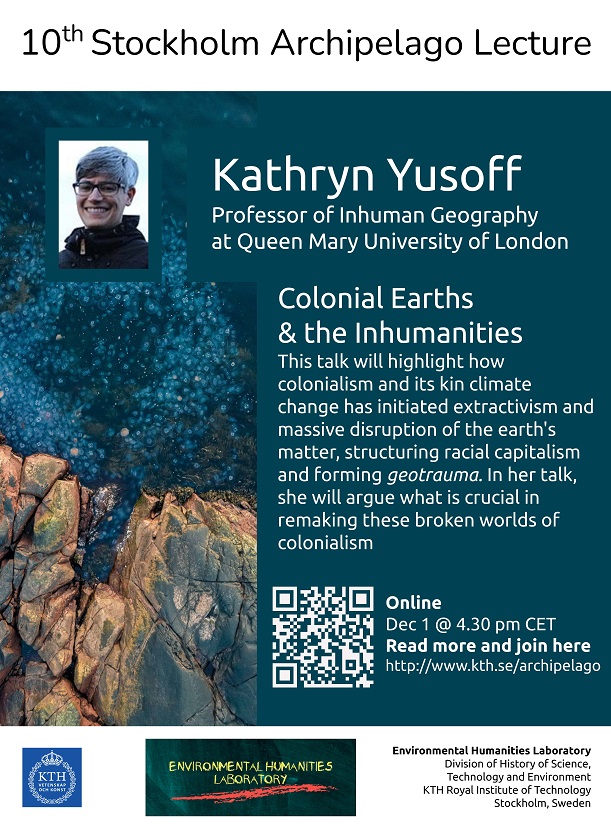Past Events
The 12th Archipelago Lecture, December 7th, 2023:
Michelle Bastian
"Is slowing down a trap?"
Abstract:
Thinking around sustainability has suggested at least five narratives of ‘sustaining time’ – that is stories about what kind of time will support more sustainable futures. These narratives often seek to counter a sped-up, over-worked, short-term, progress-oriented world. In contrast, a sustainable world is imagined as one imbued with long-term thinking, various versions of de-growth, a slower pace, more cyclical processes, and reduced working hours. In this year Archipelago Lecture, field philosopher Michelle Bastian suggests that the charisma of these sustaining times may actually reduce our ability to respond well to the current polycrisis, by pushing us to think of binary solutions to the problem of time. Far from providing solutions, she argues that these alternatives often perform a concern with time, while at best maintaining the status quo, or worse, covering over increasing destruction and inequality. She will instead suggest that in order to think about what is really crucial for re-storying time for more livable futures we need more detailed, concrete, and relational interventions that take context into account.
About Michelle Bastian

Michelle Bastian works in the areas of critical time studies and environmental humanities, with a broad focus on the role of time in social processes of inclusion and exclusion. Currently, her work is focused on time-keeping practices in the context of the climate crisis, and developing humanities approaches to phenology, the scientific study of life-cycle timing in plants, animals, and environments. She is an Associate Professor II at the University of Oslo with the Oslo School of Environmental Humanities, and in 2021-2022 was a Mid-Career Fellow supported by the Independent Social Research Foundation.
The 11th Archipelago Lecture, November 10, 2022:
Rob Nixon
The Less Selfish Gene: Forest Altruism, Neoliberalism, and the Tree of Life
Recording:
Abstract
Why have millions of readers and viewers become magnetized by the hitherto arcane field of plant communication? Since the great recession of 2008, we have witnessed an upsurge in public science writing that has popularized research into forest sentience, forest suffering and the forest as collective intelligence.
This talk roots the current appeal of forest communication in a widespread discontent with neoliberalism’s antipathy to cooperative ways of being. Nixon argues that the science of forest dynamics offers a counter-narrative of flourishing, an allegory for what George Monbiot has called “private sufficiency and public wealth.

Recordings:
The 10th Archipelago Lecture:
Kathryn Yusoff
Colonial Earths & the Inhumanities
December 1, 2021, 16.30 CET, online
Kathryn Yusoff is Professor of Inhuman Geography in the School of Geography at Queen Mary, University of London. Her research examines how inhuman and nonorganic materialities have consequences for how we understand issues of environmental change, race, and subjectivity. She is the author of A Billion Black Anthropocenes or None(University of Minnesota Press, 2018), a SI on Geosocial Formations and the Anthropocene (with Nigel Clark) in Theory Culture and Society, Epochal Aesthetics in E-flux, and The Inhumanities in The Annals of American Geographers. Her forthcoming book, Geologic Life: Inhuman Intimacies and the Geophysics of Race addresses the histories of geology and the gravities of race.
Abstract
This talk starts with the simple recognition that colonialism (and its kin, climate change) is an ongoing process of breaking ground and broken earths. Colonialism instigated extractivism and the massive disruption of earthly matter through epistemic detachment (or ‘White geology’) and its ontologies of rupture. These broken earths are an anticipatory and affective architecture of the ongoing sedimentations of colonialism that structure racial capitalism. By recognizing these colonial afterlives as forms of geotrauma—a trauma that is specifically concerned with the geos through displacement and desecration—it is possible to situate race within acts of desecration that require geographic re-description. Kathryn Yusoff argues that understanding the Environmental Humanities alongside its colonial twin—the Inhumanities—is crucial to remaking broken worlds.
The 9th Stockholm Archipelago Lecture:
Achille Mbembe
Reflections on Planetary Habitability
25 November 2020
We proudly present Prof. Achille Mbembe for this years Archipelago Lecture. Achille is a professor in History and Politics, University of the Witwatersrand, Johannesburg, South Africa. A member of the United States Academy of Arts and Sciences, and he is the author of numerous books, including ON THE POSTCOLONY (2010), CRITIQUE OF BLACK REASON (2017), and NECROPOLITICS (2020). His books have been translated in many languages.
The complete talk is available on Facebook
Past lectures:











Accessability note: the pictures from most past events contains text, by entering the links for each event you will be able to read this text. If a link is broken or if you have other questions on accessability and the events, please send an email to: history@abe.kth.se
